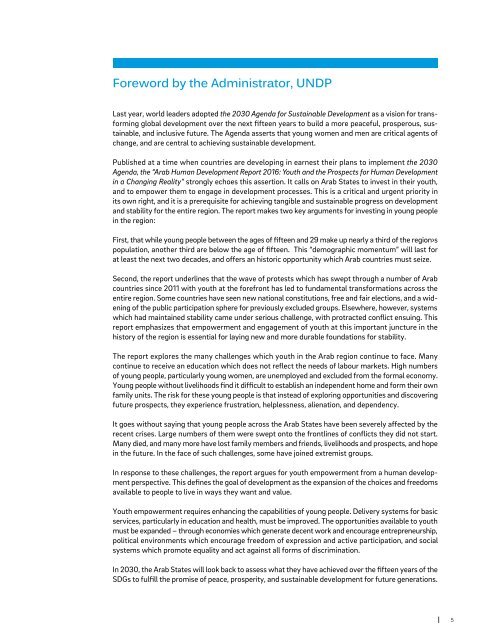Arab Human Development Report 2016
z6bSXU
z6bSXU
You also want an ePaper? Increase the reach of your titles
YUMPU automatically turns print PDFs into web optimized ePapers that Google loves.
Foreword by the Administrator, UNDP<br />
Last year, world leaders adopted the 2030 Agenda for Sustainable <strong>Development</strong> as a vision for transforming<br />
global development over the next fifteen years to build a more peaceful, prosperous, sustainable,<br />
and inclusive future. The Agenda asserts that young women and men are critical agents of<br />
change, and are central to achieving sustainable development.<br />
Published at a time when countries are developing in earnest their plans to implement the 2030<br />
Agenda, the “<strong>Arab</strong> <strong>Human</strong> <strong>Development</strong> <strong>Report</strong> <strong>2016</strong>: Youth and the Prospects for <strong>Human</strong> <strong>Development</strong><br />
in a Changing Reality” strongly echoes this assertion. It calls on <strong>Arab</strong> States to invest in their youth,<br />
and to empower them to engage in development processes. This is a critical and urgent priority in<br />
its own right, and it is a prerequisite for achieving tangible and sustainable progress on development<br />
and stability for the entire region. The report makes two key arguments for investing in young people<br />
in the region:<br />
First, that while young people between the ages of fifteen and 29 make up nearly a third of the region›s<br />
population, another third are below the age of fifteen. This “demographic momentum” will last for<br />
at least the next two decades, and offers an historic opportunity which <strong>Arab</strong> countries must seize.<br />
Second, the report underlines that the wave of protests which has swept through a number of <strong>Arab</strong><br />
countries since 2011 with youth at the forefront has led to fundamental transformations across the<br />
entire region. Some countries have seen new national constitutions, free and fair elections, and a widening<br />
of the public participation sphere for previously excluded groups. Elsewhere, however, systems<br />
which had maintained stability came under serious challenge, with protracted conflict ensuing. This<br />
report emphasizes that empowerment and engagement of youth at this important juncture in the<br />
history of the region is essential for laying new and more durable foundations for stability.<br />
The report explores the many challenges which youth in the <strong>Arab</strong> region continue to face. Many<br />
continue to receive an education which does not reflect the needs of labour markets. High numbers<br />
of young people, particularly young women, are unemployed and excluded from the formal economy.<br />
Young people without livelihoods find it difficult to establish an independent home and form their own<br />
family units. The risk for these young people is that instead of exploring opportunities and discovering<br />
future prospects, they experience frustration, helplessness, alienation, and dependency.<br />
It goes without saying that young people across the <strong>Arab</strong> States have been severely affected by the<br />
recent crises. Large numbers of them were swept onto the frontlines of conflicts they did not start.<br />
Many died, and many more have lost family members and friends, livelihoods and prospects, and hope<br />
in the future. In the face of such challenges, some have joined extremist groups.<br />
In response to these challenges, the report argues for youth empowerment from a human development<br />
perspective. This defines the goal of development as the expansion of the choices and freedoms<br />
available to people to live in ways they want and value.<br />
Youth empowerment requires enhancing the capabilities of young people. Delivery systems for basic<br />
services, particularly in education and health, must be improved. The opportunities available to youth<br />
must be expanded – through economies which generate decent work and encourage entrepreneurship,<br />
political environments which encourage freedom of expression and active participation, and social<br />
systems which promote equality and act against all forms of discrimination.<br />
In 2030, the <strong>Arab</strong> States will look back to assess what they have achieved over the fifteen years of the<br />
SDGs to fulfill the promise of peace, prosperity, and sustainable development for future generations.<br />
5


